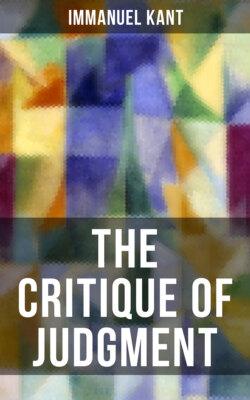Читать книгу THE CRITIQUE OF JUDGMENT - Immanuel Kant - Страница 11
На сайте Литреса книга снята с продажи.
VI. OF THE COMBINATION OF THE FEELING OF PLEASURE WITH THE CONCEPT OF THE PURPOSIVENESS OF NATURE.
ОглавлениеTable of Contents
The thought harmony of nature in the variety of its particular laws with our need of finding universality of principles for it, must be judged as contingent in respect of our insight, but yet at the same time as indispensable for the needs of our Understanding, and consequently as a purposiveness by which nature is harmonised with our design, which, however, has only knowledge for its aim. The universal laws of the Understanding, which are at the same time laws of nature, are just as necessary (although arising from spontaneity) as the material laws of motion. Their production presupposes no design on the part of our cognitive faculty, because it is only by means of them that we, in the first place, attain a concept of what the cognition of things (of nature) is, and attribute them necessarily to nature as Object of our cognition in general. But, so far as we can see, it is contingent that the order of nature according to its particular laws, in all its variety and heterogeneity possibly at least transcending our comprehension, should be actually conformable to these [laws]. The discovery of this [order] is the business of the Understanding which is designedly borne towards a necessary purpose, viz. the bringing of unity of principles into nature, which purpose then the Judgement must ascribe to nature, because the Understanding cannot here prescribe any law to it.
The attainment of that design is bound up with the feeling of pleasure, and since the condition of this attainment is a representation a priori,—as here a principle for the reflective Judgement in general,—therefore the feeling of pleasure is determined by a ground a priori and valid for every man, and that merely by the reference of the Object to the cognitive faculty, the concept of purposiveness here not having the least reference to the faculty of desire. It is thus quite distinguished from all practical purposiveness of nature.
In fact, although from the agreement of perceptions with laws in accordance with universal natural concepts (the categories), we do not and cannot find in ourselves the slightest effect upon the feeling of pleasure, because the Understanding necessarily proceeds according to its nature without any design; yet, on the other hand, the discovery that two or more empirical heterogeneous laws of nature may be combined under one principle comprehending them both, is the ground of a very marked pleasure, often even of an admiration, which does not cease, though we may be already quite familiar with the objects of it. We no longer find, it is true, any marked pleasure in the comprehensibility of nature and in the unity of its divisions into genera and species, whereby are possible all empirical concepts, through which we cognise it according to its particular laws. But this pleasure has certainly been present at one time, and it is only because the commonest experience would be impossible without it that it is gradually confounded with mere cognition and no longer arrests particular attention. There is then something in our judgements upon nature which makes us attentive to its purposiveness for our Understanding—an endeavour to bring, where possible, its dissimilar laws under higher ones, though still always empirical—and thus, if successful, makes us feel pleasure in that harmony of these with our cognitive faculty, which harmony we regard as merely contingent. On the other hand, a representation of nature would altogether displease, by which it should be foretold to us that in the smallest investigation beyond the commonest experience we should meet with a heterogeneity of its laws, which would make the union of its particular laws under universal empirical laws impossible for our Understanding. For this would contradict the principle of the subjectively-purposive specification of nature in its genera, and also of our reflective Judgement in respect of such principle.
This presupposition of the Judgement is, however, at the same time so indeterminate as to how far that ideal purposiveness of nature for our cognitive faculty should be extended, that if we were told that a deeper or wider knowledge of nature derived from observation must lead at last to a variety of laws, which no human Understanding could reduce to a principle, we should at once acquiesce. But still we more gladly listen to one who offers hope that the more we know nature internally, and can compare it with external members now unknown to us, the more simple shall we find it in its principles, and that the further our experience reaches the more uniform shall we find it amid the apparent heterogeneity of its empirical laws. For it is a mandate of our Judgement to proceed according to the principle of the harmony of nature with our cognitive faculty so far as that reaches, without deciding (because it is not the determinant Judgement which gives us this rule) whether or not it is bounded anywhere. For although in respect of the rational use of our cognitive faculty we can determine such bounds, this is not possible in the empirical field.
